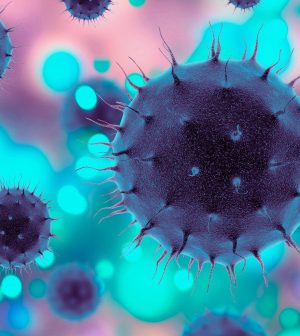- Could Your Grocery Store Meat Be Causing Recurring UTIs?
- Are You Making This Expensive Thermostat Error This Winter?
- Recognizing the Signs of Hypothyroidism
- 10 Strategies to Overcome Insomnia
- Could Artificial Sweeteners Be Aging the Brain Faster?
- Techniques for Soothing Your Nervous System
- Does the Water in Your House Smell Funny? Here’s Why
- Can a Daily Dose of Apple Cider Vinegar Actually Aid Weight Loss?
- 6 Health Beverages That Can Actually Spike Your Blood Sugar
- Treatment Options for Social Anxiety Disorder
Scientists Developing mRNA-Based Vaccine Against H5N1 Bird Flu

An experimental mRNA vaccine against the H5N1 avian flu is highly effective in preventing severe illness and death in lab animals, researchers report.
The vaccine could help fight the H5N1 bird flu outbreaks now spreading in wild birds, poultry and cows in the United States, researchers said.
Stopping those outbreaks is key to preventing the H5N1 flu from leaping into humans, researchers said.
The vaccine was created using the same techniques that produced the COVID vaccines.
“The mRNA technology allows us to be much more agile in developing vaccines; we can start creating a mRNA vaccine within hours of sequencing a new viral strain with pandemic potential,” said senior researcher Scott Hensley, a professor of microbiology at the University of Pennsylvania’s Perelman School of Medicine, in Philadelphia.
“During previous influenza pandemics, like the 2009 H1N1 pandemic, vaccines were difficult to manufacture and did not become available until after the initial pandemic waves subsided,” Hensley added in a university news release.
Most flu vaccines are developed using eggs.
Experts inject fertilized chicken eggs with flu strains they expect will be the most dominant and virulent and let it replicate. They then inactivate the virus to use in flu shots.
But it can take up to six months for viruses to be adapted to replicate in fertilized eggs, delaying production past the critical first few months of a pandemic.
“Before 2020, experts thought the influenza virus posed the greatest risk of causing a pandemic, and we had limited options for creating a vaccine if that had happened,” said researcher Dr. Drew Weissman, director of vaccine research at Penn Medicine.
“COVID-19 showed us the power of mRNA-based vaccines as tool to protect humans from emerging viruses quickly, and we are better prepared now to respond to a variety of viruses with pandemic potential, including influenza,” Weissman added.
The mRNA vaccine specifically targets the subtype of H5N1 virus that is circulating widely in birds and cows.
That strain rarely infects humans, but there are concerns that if the virus continues to spread it could evolve and cause a human pandemic, researchers said.
The experimental vaccine elicited a strong immune response in lab mice and ferrets, researchers reported May 23 in the journal Nature Communications.
What’s more, the lab animals maintained high levels of antibodies a year after infection, and vaccinated animals infected with H5N1 cleared the virus quicker and suffered fewer symptoms than unvaccinated critters.
The mRNA flu vaccine also proved as effective as a vaccine produced using traditional egg-based methods, researchers added. Both vaccines elicited strong antibody responses in lab animals.
More information
The U.S. Centers for Disease Control and Prevention have more about the bird flu.
SOURCE: University of Pennsylvania, news release, May 23, 2024
Source: HealthDay
Copyright © 2026 HealthDay. All rights reserved.










